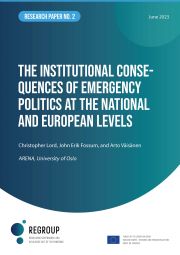Abstract
A distinctive institutional configuration of multi-level emergency governance emerged in response to the pandemic. Member State democracies provided many of the coercive powers needed to deal with the immediate exigencies of a health emergency. The European Union developed novel and important coordinating roles in dealing with collective action problems. This paper proposes a framework for evaluating that institutional configuration. It assumes that legitimacy is the absence of domination and that, in emergencies, the main risks of domination come from executives. Here democracies – and groups of democracies – need to walk a tightrope. Individuals or whole democracies can be dominated either by the absence of executive powers able to solve the collective action problems that constitute emergencies or by executives that act with insufficient parliamentary, judicial or electoral oversight; or offend rights; or create externalities that produce democracy-on-democracy forms domination. We discuss how those risks are likely to vary across the levels of European emergency governance.
Keywords: Covid-19 pandemic; emergency; European Union; executive dominance.
Full info
Christopher Lord, John Erik Fossum, and Arto Väisänen
The Institutional Consequences of Emergency Politics at the National and European Levels
Zenodo
